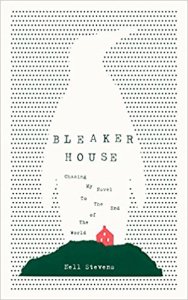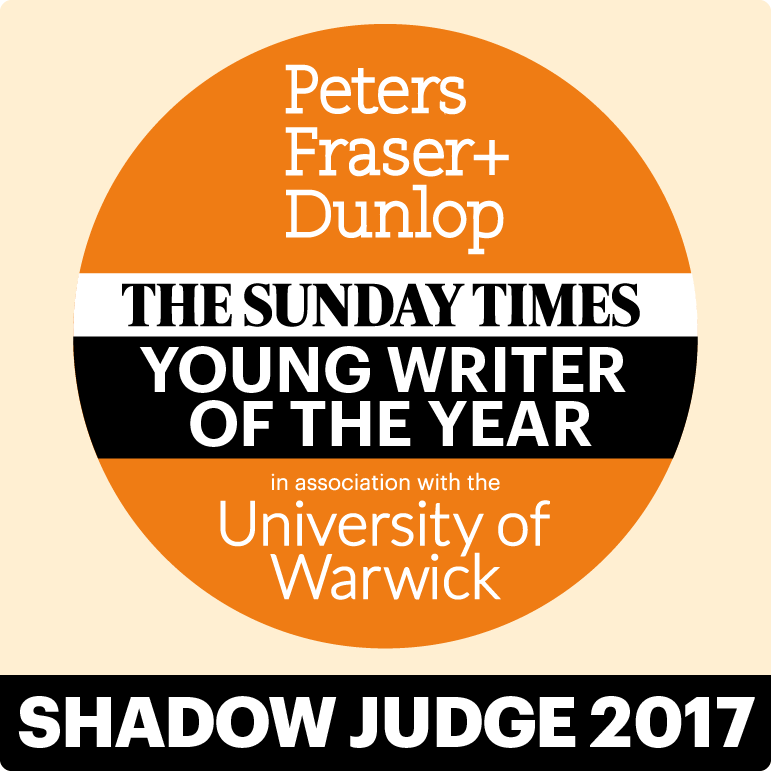I have been reading more non-fiction than ever recently, moving away from the science and medical themed books I covered for the Wellcome Book Prize shortlist to memoirs about all things literary, specifically writing, libraries and children’s literature. Here are three titles I recommend to bookworms everywhere:
 Bleaker House: Chasing My Novel to the End of the World by Nell Stevens is an account of her attempt to write a novel by living in the Falkland Islands for three months using funding from her Global Fellowship at the end of her creative writing course at Boston University. After arriving in Stanley where many of the 2,500 residents are based, she lived in self-imposed isolation on the uninhabited Bleaker Island for several weeks, believing that a total lack of distraction would be beneficial for her levels of creativity and productivity. For her stint on Bleaker Island, she had to pack all of her food supplies, restricting herself to just over 1,000 calories a day living mostly on instant porridge and Ferrero Rocher with just a copy of the film ‘Eat Pray Love’ on her laptop for company. Despite the unusual setting, Stevens’ experience of writing procrastination will resonate with anyone who has ever had an essay deadline to meet, even if her expectations and lack of preparation for some aspects of her trip are a tad infuriating in places. Extracts of her fiction are interspersed throughout and while these chapters are variable in quality and pad out what would otherwise be a very slim book, I think they are worth reading to get a sense of her creative output at the time. Overall, this is an interesting and often very funny account of a unique travel experience which proved to be inspiring for Stevens in the end, even if it wasn’t quite in the way she had initially bargained for.
Bleaker House: Chasing My Novel to the End of the World by Nell Stevens is an account of her attempt to write a novel by living in the Falkland Islands for three months using funding from her Global Fellowship at the end of her creative writing course at Boston University. After arriving in Stanley where many of the 2,500 residents are based, she lived in self-imposed isolation on the uninhabited Bleaker Island for several weeks, believing that a total lack of distraction would be beneficial for her levels of creativity and productivity. For her stint on Bleaker Island, she had to pack all of her food supplies, restricting herself to just over 1,000 calories a day living mostly on instant porridge and Ferrero Rocher with just a copy of the film ‘Eat Pray Love’ on her laptop for company. Despite the unusual setting, Stevens’ experience of writing procrastination will resonate with anyone who has ever had an essay deadline to meet, even if her expectations and lack of preparation for some aspects of her trip are a tad infuriating in places. Extracts of her fiction are interspersed throughout and while these chapters are variable in quality and pad out what would otherwise be a very slim book, I think they are worth reading to get a sense of her creative output at the time. Overall, this is an interesting and often very funny account of a unique travel experience which proved to be inspiring for Stevens in the end, even if it wasn’t quite in the way she had initially bargained for.
 Reading Allowed by Chris Paling is very much the library equivalent of The Diary of a Bookseller by Shaun Bythell in which Paling muses on the ups and downs of working in an unnamed public library in the south of England. Just as Bythell did for bookshops, Paling debunks several idealised myths about libraries, worries about the financial problems facing them in the midst of cuts to council budgets and the impact of technology on their future purpose. He also spends much of his time observing the people who frequent the building. The customer service aspect of his job often entails challenging situations involving some of the most vulnerable people in society – sometimes humorous and sometimes sad. Episodic in structure and interspersed with facts about libraries such as the origins of the Dewey decimal system, this is an entertaining look at one of the most precious public services we have.
Reading Allowed by Chris Paling is very much the library equivalent of The Diary of a Bookseller by Shaun Bythell in which Paling muses on the ups and downs of working in an unnamed public library in the south of England. Just as Bythell did for bookshops, Paling debunks several idealised myths about libraries, worries about the financial problems facing them in the midst of cuts to council budgets and the impact of technology on their future purpose. He also spends much of his time observing the people who frequent the building. The customer service aspect of his job often entails challenging situations involving some of the most vulnerable people in society – sometimes humorous and sometimes sad. Episodic in structure and interspersed with facts about libraries such as the origins of the Dewey decimal system, this is an entertaining look at one of the most precious public services we have.
 Finally, I bought The Child That Books Built by Francis Spufford in Edinburgh last summer after hearing him speak at the book festival about his debut novel Golden Hill. Before turning his hand to fiction, Spufford has been a prolific writer of non-fiction on a variety of subjects for many years and his 2002 memoir about childhood reading is a nostalgic look at the books which shaped his early life in the 1970s and 1980s, with C. S. Lewis, Laura Ingalls Wilder and Ursula K. Le Guin among his favourite authors. His journey through the books he read as a child is structured around four key settings: “The Forest” about the fairy stories from early childhood, “The Island” which recounts the thrill of adventure stories in imaginary worlds, “The Town” about the books set in the “real world” explaining how society works and “The Hole” which details the awkward transition to adult fiction during adolescence. I expected this to be a more personal bibliomemoir given that Spufford explains in the first chapter how reading became a private sanctuary for him when his younger sister Bridget was diagnosed with cystinosis, a rare genetic disorder. Indeed, Spufford isn’t exaggerating when he says the book is “more about books than it is about me” which may disappoint some readers. However, while some of the theoretical passages are a bit meandering in places, ‘The Child That Books Built’ serves as an insightful reminder that the first books we read as children have a lasting impact on us, even if we’re not always conscious of exactly how or why this happens.
Finally, I bought The Child That Books Built by Francis Spufford in Edinburgh last summer after hearing him speak at the book festival about his debut novel Golden Hill. Before turning his hand to fiction, Spufford has been a prolific writer of non-fiction on a variety of subjects for many years and his 2002 memoir about childhood reading is a nostalgic look at the books which shaped his early life in the 1970s and 1980s, with C. S. Lewis, Laura Ingalls Wilder and Ursula K. Le Guin among his favourite authors. His journey through the books he read as a child is structured around four key settings: “The Forest” about the fairy stories from early childhood, “The Island” which recounts the thrill of adventure stories in imaginary worlds, “The Town” about the books set in the “real world” explaining how society works and “The Hole” which details the awkward transition to adult fiction during adolescence. I expected this to be a more personal bibliomemoir given that Spufford explains in the first chapter how reading became a private sanctuary for him when his younger sister Bridget was diagnosed with cystinosis, a rare genetic disorder. Indeed, Spufford isn’t exaggerating when he says the book is “more about books than it is about me” which may disappoint some readers. However, while some of the theoretical passages are a bit meandering in places, ‘The Child That Books Built’ serves as an insightful reminder that the first books we read as children have a lasting impact on us, even if we’re not always conscious of exactly how or why this happens.





These sound fantastic. As someone whose alternative career would have been a librarian, I’m curious to read what the reality is actually like.
LikeLike
It’s an eye-opening book! 🙂
LikeLiked by 1 person
The library book sounds great! I have read “The Child that Books Built” but don’t even remember it being in those sections! When did I read it? … ah, that’ll be why I can’t find a review, I bought it in January 2003 (I still have my copy and it’s on my Books About Books shelf which is on the same floor as my study) and would have read it within the year – and I started blogging in 2005!
LikeLike
Might be worth a reread! 🙂
LikeLiked by 1 person
I felt sure one of your selections was going to be Lucy Mangan’s Bookworm! 🙂 (Which I also recommend.) I’ve read the Stevens and Spufford books, and skimmed Paling’s. I struggled with the aimlessness and indulgent fictional passages in Bleaker House, though it was an interesting read. I’m looking forward to her new book.
LikeLike
Yes, I like the sound of Lucy Mangan’s book so will definitely look out for it!
LikeLike
I have the Spufford and Stevens on my own shelves – but the one I’m most drawn to is Chris Paling’s book – which I don’t already own – ain’t that always the way!
LikeLike
Every time! 🙂
LikeLike
Ooh, what fun reviews! I love books about books, like many readers, I think. Having just discovered your blog, I’ll have to check your archives for your science and medicine nonfiction reviews too, since that’s one of my favorite sub-genres 🙂
LikeLike
Thanks!
LikeLike
‘The Child That Books Built’ is a fantastic title.
LikeLike
I agree!
LikeLiked by 1 person
This is a brilliant list of books!! I will definitely try to read Bleaker House! Thank you for adding books to my TBR!
Fellow bookworms, here’s my blog: https://thevoraciousbibliophile.wordpress.com
LikeLike
Thanks!
LikeLiked by 1 person
Pingback: More Books I Read in June | A Little Blog of Books